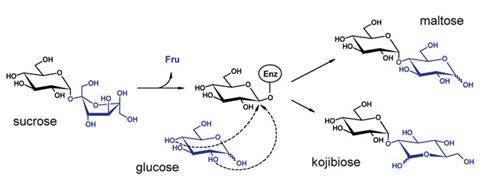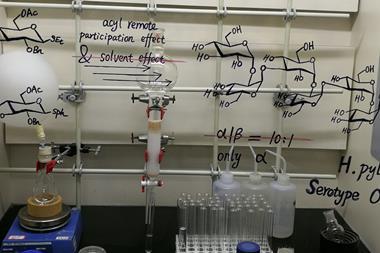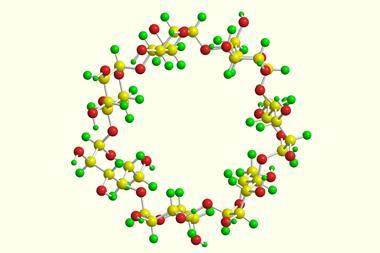Cheaper and cleaner route to health-boosting carbohydrate that could replace conventional sugar in food
European scientists have developed an enzyme to cleanly and cheaply produce a healthier sugar with prebiotic properties.
Prebiotics – compounds that nourish the good bacteria in our gut – have become important synthetic targets due to their potential role in preventing diseases such as obesity and type 2 diabetes. There are a limited number currently available for use in food, and most do not have the additional benefit of tasting sweet.

The rare disaccharide, a-1,2-glucobiose, commonly known as kojibiose, is an ideal substitute for classic table sugars such as sucrose and fructose. It tastes sweet but is low calorie, does not cause tooth decay and is also a prebiotic. Until now, kojibiose has been very difficult to obtain in testable quantities. Although the enzyme sucrose phosphorylase can produce the sugar from cheap substrates sucrose and glucose, it is only a side product and is hard to isolate.
Tom Desmet’s research group at the University of Ghent, Belgium, specialises in enzyme modification and stumbled upon the sugar by accident: ‘We were playing around with the enzyme [sucrose phosphorylase] and as it so often goes, noticed by accident that it forms very small amounts of this alternative sugar,’ reflects Desmet. ‘So we set out to improve the enzyme to be really dedicated to the product.’ Using a combination of rational protein design and random mutagenesis, Tom Verhaeghe, a PhD student in Desmet’s group, developed a double mutant enzyme with over 95% selectivity for kojibiose production.
With this biocatalyst, the group can produce kojibiose at potentially industrial scales, using very cheap starting materials and a final purity exceeding 99%. ‘The study is remarkable in that it covers all the engineering steps required in successful biocatalytic process development, from the enzyme to the product,’ observes Bernd Nidetzky, a researcher in enzymatic carbohydrate synthesis at the Graz University of Technology in Austria.
Desmet now hopes to work with the food industry to assess whether kojibiose is a viable substitute for traditional sugar. A number of large companies have already approached his team. Jürgen Seibel, a biocatalysis and glycoscience researcher at the University of Würzburg, Germany, agrees that this should be the next step. ‘I would now focus on what the applications of this sugar are. They have paved the way; these are the things that could now be studied because the sugar is much more available for testing.’
References
This article is free to access until 30 March 2016
T Verhaeghe et al, Chem. Commun., 2016, DOI: 10.1039/c5cc09940d












No comments yet